

Georgia activists call for Coca-Cola boycott over ‘deafening silence’ on voting rights. Georgia activists are calling for a statewide boycott of Coca-Cola as part of an escalating effort to get major corporations to oppose significant voting restrictions Republicans in the state legislature are on the verge of approving.
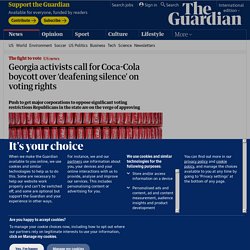
Sign up for the Guardian's Fight to Vote newsletter The call for the boycott, first reported by the Atlanta Journal Constitution, is coming from leaders of the sixth district of the AME church, which includes more than 500 Black churches in Georgia. Bishop Reginald Thomas Jackson, the presiding prelate, said that there had been a “deafening silence” around voting rights from Coca-Cola and other companies that had put out statements last year supporting the Black Lives Matter movement.
“Our position is they’ve not lived up to their own words. By your silence you’re actually being complicit. But those major companies have declined to speak out directly against the bills. Coca-Cola And Its Warning Against Taxpayer Complacency. Coca-Cola fizzles out in Lebanon with economic downturn. End of an era? Soft drinks category report 2020. How Pepsi and Coke make millions bottling tap water, as residents face shutoffs.
In recent weeks, on a quiet stretch of Detroit’s west side dotted with vacant homes, a 262,000 sq ft Coca-Cola manufacturing facility has buzzed with activity, even as many businesses in Michigan were ordered by the state to temporarily close to combat the coronavirus pandemic.
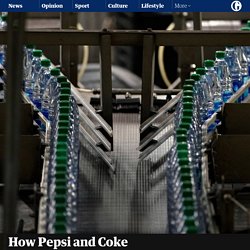
Coca-Cola churns out a number of beverages here, including Dasani, the company’s well-known bottled water that generated more than $1bn in US sales in the past year, according to the market research firm IRI. It’s a good time to be in the water business: as the coronavirus outbreak spread in the US throughout March, bottled water sales increased 57% over the same period last year.
But among the products, like toilet paper or hand sanitizer, that Americans are panic-buying, bottled water is unusual: there is no shortage of safe drinking water, and health officials have tried to assure people that public water supplies are not contaminated by the coronavirus. The business model is hugely profitable.
Queensland school runs out of water as commercial bottlers harvest local supplies. The Tamborine Mountain state school has run out of water, even as water miners in the Gold Coast hinterland are sending millions of litres to commercial bottling operations.
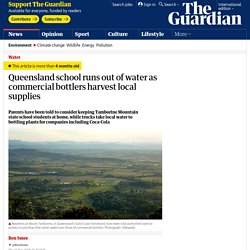
Trucks sent by the Queensland government carrying emergency supplies to the school, including Mount Tamborine bottled water, have been passing trucks heading in the opposite direction taking local water to bottling plants for beverage giants such as Coca-Cola. The school remains open but parents have been advised by teachers to consider keeping their children at home. Water miners in the Mount Tamborine area supply roughly 130m litres of water each year to commercial bottling operations. Running on empty: Tamborine Mountain and the growing anger over water mining. At Tamborine Mountain, one of the largest sources of Australia’s bottled drinking water, locals are waiting more than six weeks for deliveries to fill their dry water tanks.
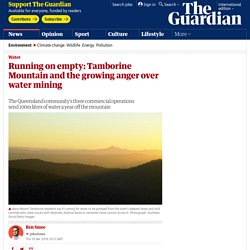
The community in the Gold Coast hinterland is one of very few in eastern Australia with no reticulated water supply. Dozens of local bores have run dry as a result of the drought, and many others flow intermittently. The backup water source, a tanker filling station at nearby Canungra, has been closed until further notice. “It’s all becoming pretty dire,” says Michael O’Leary, a resident for about 24 years. A few weeks ago, his rainwater tanks ran dry and he discovered the long backlog of locals waiting for water deliveries. “It just gets a bit upsetting where people are struggling for water to see tankers where people are driving off the mountain every day delivering water to presumably water bottling companies,” he says. “I’m not living in Goondiwindi,” another resident, Renata Harmer, tells Guardian Australia. Government pressured to declare water emergency at Tamborine Mountain. In December 2019 it has received about one-fifth (35.3 millimetres) of its average December rainfall (164.3 millimetres) and received most of that in one 20 millimetres fall on December 2.
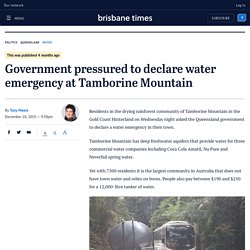
The high school water bore ran dry in mid-2019 and the primary school bore ran dry on December 11. Residents group Save Our Water - Tamborine Mountain last night staged a community meeting to formalise a petition calling on Natural Resources Minister Anthony Lynham to declare to a water emergency. That would allow Dr Lynham to regulate the supply of all water to homes, farmers and companies the mountain. The local residents believe the water drawn from aquifers by three commercial water companies; run by businessmen Alan Robert, John Penglis and Brian Bennett, is impacting local water supplies which have been severely diminished in the drought.
Corruption of Science: Coca-Cola's Shady Record in Obesity Research – 'Dracula in Charge of the Blood Bank' It was revealed back in 2015 that Coca Cola invested at least $4 million in founding the ‘Global Energy Balance Network’ (GEBN), a non-profit organization run by university scientists engaged in obesity research projects.

The group said that halting weight gain should be less about dieting and more about “maintaining an active lifestyle and eating more calories“. They claimed that there was no compelling evidence to suggest that people should blame fast food and sugary drinks for the obesity epidemic. GEBN’s message was that “obesity is not about the foods or beverages you’re consuming, it’s that you’re not balancing those foods with exercise“. Their main claim was that there was “strong evidence” that lack of exercise is mostly to blame for obesity, not poor diet. GEBN’s website and social media pages are no longer available after their industry-sponsorship came to public awareness. Dr. That fell on deaf ears, as we are about to see. Complexity and conflicts of interest statements: a case-study of emails exchanged between Coca-Cola and the principal investigators of the International Study of Childhood Obesity, Lifestyle and the Environment (ISCOLE)
Here we take advantage of a case-study where we look beneath the surface of disclosure of conflict-of-interest statements to better understand the relationship between an industry sponsor and public health academics.
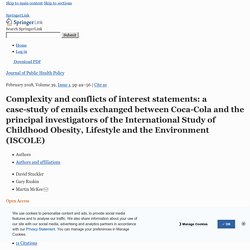
In this case, we focus on researchers in the United States (US), using emails obtained through the Freedom of Information requests (FOI) in the state of Louisiana. In some countries, individuals have a legal right to ask public bodies, which may include public universities, to reveal documentary material that they hold on particular issues. How Coca-Cola Controls and Manipulates Research. I’ve written about the collusion between industry and the U.S. federal regulatory agencies on many occasions throughout the years, and how industry-funded research simply tends to promote and support the industry agenda rather than shed truthful light on the benefits or risks of any given product.
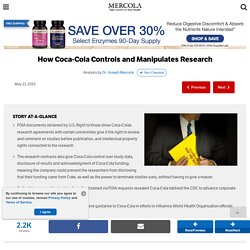
In recent years, the hidden influence of The Coca-Cola Company over health and sugar science has been highlighted several times and, according to recent findings, it appears the company has not changed its secretive and deceptive ways, despite public assurances of transparency. Coca cola globalization. Coca cola protest. Coca Cola facing terrorism support charges in Colombia.
Multinational beverage producer Coca Cola is one of more than 50 companies that will be charged with financing the now-defunct Colombian paramilitary AUC group, a designated terrorist organization.
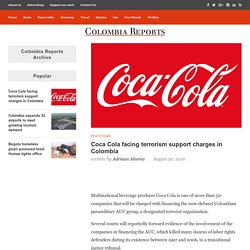
Several courts will reportedly forward evidence of the involvement of the companies in financing the AUC, which killed many dozens of labor rights defenders during its existence between 1997 and 2006, to a transitional justice tribunal. Among the 57 companies are other major multinationals like Chiquita and Drummond. Colombia’s state-run oil company Ecopetrol, the country’s largest soft-drink producer Postobon and the country’s largest cement company, Cementos Argos are also among the suspected terrorism supporters. Top Colombia TV network compromised over paramilitary support claims. Campaign to Stop Killer Coke.
"Coca Cola facing terrorism support charges in Colombia" By Adriaan Alsema, Colombia Reports, August 30, 2016Read Article "Multinational beverage producer Coca Cola is one of more than 50 companies that will be charged with financing the now-defunct Colombian paramilitary AUC group, a designated terrorist organization.
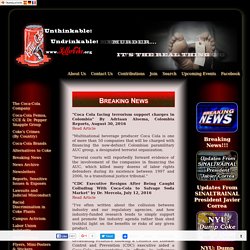
"Several courts will reportedly forward evidence of the involvement of the companies in financing the AUC, which killed many dozens of labor rights defenders during its existence between 1997 and 2006, to a transitional justice tribunal. " "CDC Executive Resigns After Being Caught Colluding With Coca-Cola to Salvage Soda Market" by Dr. Mercola, July 12, 2016Read Article. Coke, Pepsi changing ingredients to avoid cancer warnings on products. Coca-cola and Pepsi are being forced to alter the way they make the caramel colouring that is added to their soft drinks in the US.
A new Californian law has changed the way drinks containing specified levels of carcinogens are labelled, meaning the drinks would have to carry cancer warning labels. The beverage companies say they will continue to use caramel colouring but will make changes to the way it is manufactured too make it safer. Oops! Coke Apologizes After Getting Busted Spending Millions to Manipulate Science. By Dr. Harold Goldstein, Executive Director, California Center for Public Health Advocacy. Like a cat caught with the pet canary in its mouth, the world’s largest beverage company has guilt written all over its face.
With little feathers still floating all over the house, Coca-Cola wants us to believe it is filled with remorse for spending millions of dollars manipulating science, and paying-off researchers to do its bidding. Last week, the New York Times exposed the Coke-funded, Global Energy Balance Network as the industry front group that it is. Thelancet. CorpWatch : Coke and McDonalds Host Carnival of Junk Food Marketing At Rio Olympics. Every four years, billions tune in to watch the Olympics on television. And every four years, major corporations pay millions for prime advertising opportunities as official sponsors. The 2016 Olympics in Rio de Janeiro are no different with Coca-Cola and McDonald's igniting a storm of controversy over their role.
Cities that host Olympic games spend several billion dollars on new infrastructure, security and of course on pomp and glamor. India’s water crisis laid bare by clash with US cola giants. A pollution fine for Coca-Cola and an order for PepsiCo to cut water use at factories in India have highlighted an intensifying conflict between big business and farmers over natural resources. Indian village women demand the closure of Coca-Cola and PepsiCo factories due to fears over groundwater poisioning during a protest in New Delhi in October 2006.
(AFP Photo) Last month, a report commissioned by the southern state of Kerala ordered Coca-Cola to pay 47 million dollars in compensation for polluting agricultural land and extracting too much groundwater at a bottling plant. A similar report submitted at the same time instructed PepsiCo to cut groundwater use by two-thirds at its plant also in Kerala’s Palakkad district. The twin investigations were ordered by the Kerala government after years of protests by farmers who say industrial projects like those run by the soft drinks giants leave just a small fraction of water for irrigating fields. Coca-Cola faces case under SC/ST Act in Kerala. PALAKKAD: Kerala Police has registered a case against multi-national soft-drink major Coca-Cola for allegedly exploiting and polluting groundwater sources of the backward Scheduled Caste community at Plachimada here.
According to the case registered at Meenakshipuram police station here, Coca-Cola's unit at Plachimada, which after being operational for some years is shut since 2004, had "wilfully polluted" the water sources of Eravalas, one of the most backward Scheduled Caste communities in the region. When contacted, company's spokesperson said a response on the issue can be given only by tomorrow. Top company officials have been booked for non-bailable offences under various provisions of the Scheduled Castes and Scheduled Tribes (Prevention of Atrocities) Act, police said. Meenakshipuram Principal Sub Inspector VS Syamkumar said the company officials would be summoned, if needed, during the course of investigation.
Woolworths refusing to stock Coca-Cola No Sugar. EKOCENTER Delivers Safe Access to Water and Other Basic Necessities to Communities in Need. Today, more than 1 billion people lack access to safe drinking water and approximately 2.5 billion don’t have adequate sanitation, making billions of people around the world vulnerable to disease and other development challenges. To help provide communities in need with access to safe drinking water and other basic necessities, The Company, together with DEKA R&D, and other critical partners including development banks, NGOs and companies, launched EKOCENTER™ - a downtown in a box - with the Slingshot™ water purification system housed within the community center. COCA-COLA COMMITS TO CLIMATE-FRIENDLY REFRIGERATION THROUGH ENGAGEMENT WITH GREENPEACE. Coca Cola. Sustainability: The Coca-Cola Company. Should I Drink Diet Soda? Welcome to Should I Eat This? —our weekly poll of five experts who answer nutrition questions that gnaw at you. 5/5 experts say no.
Man, diet soda just can’t catch a break with these experts. Maybe that’s because it’s the ultimate hypocrite of the beverage world. Coca-Cola on Track to Meet 100% Water Replenishment Goal: The Coca-Cola Company. Well.blogs.nytimes. Tell Coca-Cola to STOP the VIOLENCE! Coke's "Downtown in a Box" Delivers Clean Water and Wi-Fi to Africa.
Consumption of artificial sweetener– and sugar-containing soda and risk of lymphoma and leukemia in men and women. © 2012 American Society for Nutrition. To this day, Coca-Cola still imports coca leaves which are used to manufacture cocaine in the United States. (NaturalNews) Coca leaves have been chewed and consumed as tea for thousands of years in the high Andes. They are rich in many essential nutrients; they ease respiratory and digestive distress and are a natural stimulant and painkiller. Indigenous tradition and scientific studies have both confirmed that in their natural form, the leaves are completely safe and non-addictive -- it takes intensive processing and toxic chemical ingredients to produce cocaine.